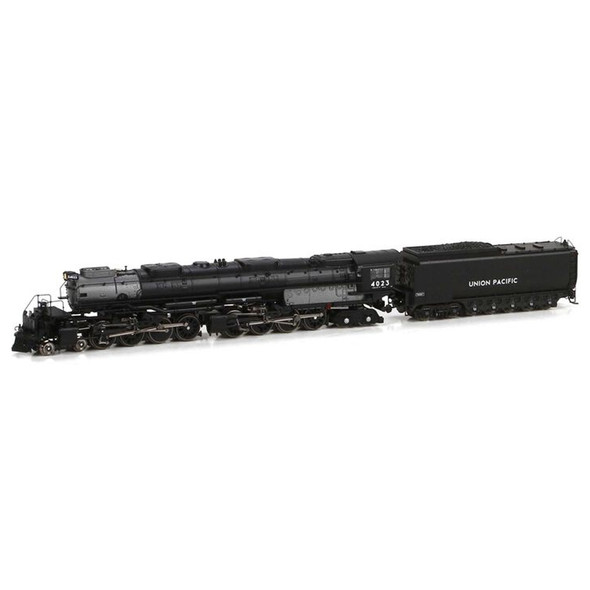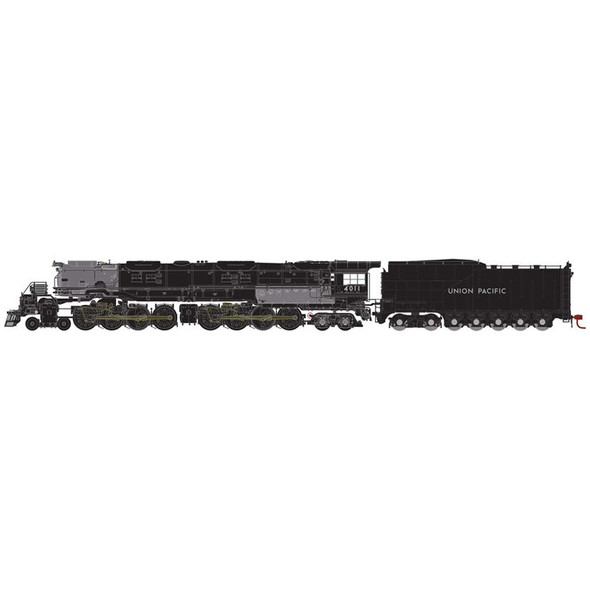Athearn
Athearn ATH30108 4-8-8-4 Big Boy Union Pacific #4002 Locomotive N Scale
- SKU:
- ATH30108
- UPC:
- 797534301085
Description
UP #4014 EXCURSION FEATURES:
Excursion Version with oil tender from UP 3985 per prototype config
Reporting marks only on rear tender face per prototype 2019 configuration
In service appearance
Commemorative box
UP #4014 PROMONTORY FEATURES:
Great Race to Promontory versionwith oil tender from UP 3985 per prototype configuration
Reporting marks only on rear tender face per prototype 2019 configuration
Freshly shopped shiny appearance
Commemorative box
Chalk marking “Big Boy” factory applied to smoke box face, per prototype during summer 2019. This marking is a subtle nod to history and ALCO legend. See details on the last page of this order sheet.
Big Boy No. 4014 was delivered to Union Pacific in December 1941. The locomotive was retired in December 1961, having traveled 1,031,205 miles in its 20 years in service. Union Pacific reacquired No. 4014 from the RailGiants Museum in Pomona, California, in 2013, and relocated it back to Cheyenne to begin a multi-year restoration process. In 2019 UP #4014 was brought back to life. It had been almost 60 years and multiple generations since the last time a 4-8-8-4 Big Boy operated under it’s own power.
SURVIVING 4-8-8-4 BIG BOY PRESERVATION INFO:
4004: Holliday Park
4005: Forney Transportation Museum
4006: Museum of Transportation
4012: Steamtown National Historic Site
4017: National Railroad Museum
4018: Museum of the American Railroad
4023: Kenefick Park
PRESERVATION VERSION FEATURES:
As delivered from ALCO in service 1940s era
Coal Tender
Twenty-five Big Boys were built exclusively for Union Pacific Railroad, the first of which was delivered in 1941. The locomotives were 132 feet long and weighed 1.2 million pounds. Because of their great length, the frames of the Big Boys were “hinged,” or articulated, to allow them to negotiate curves. They had a 4-8-8-4 wheel arrangement, which meant they had four wheels on the leading set of “pilot” wheels which guided the engine, eight drivers, another set of eight drivers, and four wheels following which supported the rear of the locomotive. The massive engines normally operated between Ogden, Utah, and Cheyenne, Wyo.
There are seven Big Boys on public display in various cities around the country. They can be found in St. Louis, Missouri; Dallas, Texas; Omaha, Nebraska; Denver, Colorado; Scranton, Pennsylvania; Green Bay, Wisconsin; and Cheyenne, Wyoming.
Source Union Pacific Railroad
WARTIME ERA VERSION FEATURES:
As delivered from ALCO in service 1940s era
Coal Tender
LOCOMOTIVE FEATURES:
Fully-assembled and ready-to-run
DCC-ready features Quick Plug™ plug-and-play technology
Scaled from prototype resources including drawings, field measurements, photographs, and more
Accurately-painted and –printed paint schemes
Full cab interior with boiler backhead with printed gauges
Individually applied piping, valves, generators, etc.
Operating eccentric cranks on both sides operating in correct direction
Headlights and indicator number boxes (number boards) with directional light change
Five pole, skewed armature motor with flywheel for smooth operation
Pivoting front and rear engines for negotiating 11” radius curves - 15” radius recommended
See-through running boards
See through cab windows
McHenry scale knuckle couplers
LED Lighting for realistic appearance
Heavy die-cast frame for greater traction and more pulling power
Packaging securely holds for the model for safe storage
SOUND EQUPPED MODELS ALSO FEATURE
Onboard DCC decoder with SoundTraxx Tsunami2 sound
Sound units operate in both DC and DCC
Chuff, whistle, and bell sounds work in DC
All functions NMRA compatible in DCC mode
Precision slow speed control
Many functions can be altered via Configuration Value (CV) changes
CV chart included in the box
PROTOTYPE SPECIFIC INFORMATION
The Union Pacific’s Overland Route, the eastern portion of the Transcontinental Railroad, was built west from Omaha, across Nebraska and Wyoming, and on into Utah. The steepest grade was the eastbound climb on the Echo Canyon line through the Wahsatch Mountains just east of Ogden, Utah. Forty 4-6-6-4 Challenger locomotives were acquired in 1936 and 1937 to move fast freight over the grades in Utah and Wyoming. They were rated at 4,290 tons across Wyoming, but were limited to 3,100 tons eastbound through Echo Canyon.
Union Pacific wanted something that could make the same speeds as the Challengers but could carry the entire 4,290-ton train over the Wahsatch Mountains without a helper. The easiest solution was to scale up the successful Challenger design by adding another pair of drivers to each half of the locomotive thus making a 4-8-8-4.
In 1941 UP placed an order for twenty 4-8-8-4’s, numbered 4000 through 4019, with the American Locomotive Works. Each engine cost $265,174. According to legend an unidentified machinist at the ALCO plant is responsible for the name “Big Boy”, having scrawled the name in chalk on a partially completed locomotive.
The Big Boys were exactly what the railroad wanted. They were coal burners with 68-inch drivers, 135,375 pounds of tractive effort and 6,000 horsepower. They started service on the line from Ogden to Green River, Wyoming and their operating range soon increased to cover the line all the way to Cheyenne.
Traffic during WWII resulted in five more Big Boys, numbered 4020 through 4024, being built in 1944. These versions were slightly heavier than the original order due to wartime materials restrictions.Despite the influx of diesel locomotives following WWII, the Big Boys and Challengers remained the prime power on the Overland Route. They also saw service as helpers, leading gas turbines and diesels over Sherman Hill. They remained active through the 1950’s and weren’t retired until the early 1960’s. By then the first twenty units had been run well over one million miles.
Specifications
DCC: Ready
SOUND: No
PROTOTYPE MANUFACTURER: ALCO
Axles: 4-8-8-4
LIGHTED: LED Lighting
FULL ROADNAME: Union Pacific
MIN. RADIUS: 11 inch
Minimum Age Recommendation: 14 years
Is Assembly Required: No










